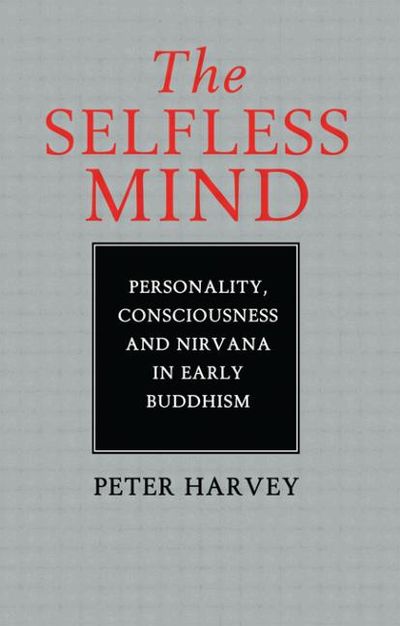- INTRODUCTION1
- Key non-Buddhist concepts1
- Key Buddhist concepts2
- 'Not-Self' and scholars7
- Sources9
- Methodology11
Part I Exploring the Notion of Selflessness
- 1. THE QUESTION OF SELF17
- Scholars who see a metaphysical Self in the 'early Suttas'17
- Uses of the word 'self' (atta) in the 'early Suttas'19
- Passages which might indicate the acceptance of a Self21
- Nibbāna as not-Self and not related to a Self23
- Self as 'not being apprehended'24
- A Self beyond 'existence' and 'non-existence'?28
- Proof of the impossibility of a Self31
- Buddhism and the Upaniṣads on Self33
- The status of the 'person'34
- Why is Self not denied?: the Buddha and the
Annihilationists38 - The 'I am' attitude: its cause, effect and its ending40
- 2 THE MEANING OF 'NOT-SELF'43
- The role of viewing phenomena as not-Self 43
- The criteria for Self-hood46
- Nibbāna and the Self-ideal51
- 3 DEVELOPING A SELF WITHOUT BOUNDARIES54
- Living with citta as an 'island'54
- Developing a 'great self'55
- 'One of developed self' 57
- The Arahat as self-contained and 'dwelling alone'58
- The Arahat's boundaryless citta60
- The Arahat's boundaryless, self-contained self62
- 4 PERSONAL CONTINUITY AND RESPONSIBILITY64
- The person as a continuity65
- Responsibility for actions66
- The stability of character traits over lives68
- What conserves character traits and the unity of the 'continuity'?72
- To what extent are 'continuities' isolated from each other and the world?74
- 5 MY WORLD AND ITS END78
- The Self-world link and the meaning of 'world' (loka)78
- The Buddhist perspective on the world79
- The undetermined questions83
- The undetermined questions on the world 84
- 6 THE LIFE-PRINCIPLE AND THE BETWEEN-LIVES STATE89
- The undetermined questions on the life-principle89
- The 'life-principle' accepted by early Buddhism91
- Discernment and rebirth95
- The question of the intermediary existence (antarā-bhava)98
- The nature of the intermediary existence102
- The gandhabba: spirit-being of the intermediary existence105
- Part II: Saṃsāric and Nibbānic Discernment109
- 7 THE CENTRALITY OF DISCERNMENT111
- The nature and centrality of citta111
- A person as discernment and the sentient body116
- The vortical interplay of discernment and the sentient body119
- 8 DISCERNMENT AND CONDITIONED ARISING122
- The nature of the constructing activities122
- The conditioning of discernment by the constructing activities124
- The conditioning of discernment by nāma-rūpa127
- Discernment as conditioned by attention129
- The conditioning of the sentient body by discernment130
- Conditioned Arising as an analysis of the perceptual process134
- 9 DISCERNMENT AND THE PERCEPTUAL PROCESS138
- The perceptual process in the 'early Suttas'138
- The nature and functions of cognition (saññā)141
- The activity of discernment (viññāṇa)143
- The functions of discernment in the Abhidhamma 'process of cittas'145
- The nature of viññāṇa148
- The effect of karma on discernment in the perceptual process151
- 10 BHAVAṄGA AND. THE BRlGHTLY SHINING MIND155
- Is the bhavaṅga concept ruled out by the 'early Sutta' world-view?155
- 'Early Sutta' evidence for a bhavaṅga-type state151
- The meaning of 'bhavaṅga'160
- The roles of bhavaṅga162
- The brightly shining citta166
- Freedom from defilements169
- The shining citta and bhavaṅga170
- The Arahat's ever-shining citta173
- The shining citta and the Buddha-nature 114
- The shining citta and the realms of rebirth 111
- 11 NIBBĀNA AS THE TIMELESS 'STOPPING' OF THE ENTIRE
PERSONALITY180 - The nibbāna-element without remainder of upādi181
- Nibbāna during life as not ever-present in the Arahat182
- The 'stopping' of the personality-factors during life185
- Nibbānic 'stopping' and nirodha-samāpatti 187
- Re-entry to the state of 'stopping'188
- Nibbāna during life as 'unborn', 'unconstructed' and 'deathless'189
- Nibbāna as a timeless object of insight193
- 12 NIBBĀNA AS A TRANSFORMED STATE OF DISCERNMENT198
- Nibbāna as a form of discernment199
- Nibbānic discernment as 'stopped', 'objectless' and 'unsupported'201
- Udāna.80 as a description of nibbānic discernment203
- The nature of nibbānic discernment205
- Unsupported discernment and nibbāna beyond death208
- The relation of nibbānic discernment to the Arahat's normal state210
- Theravādin perspectives214
- Mahāyāna perspectives217

